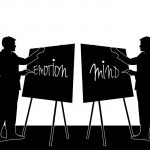
“Humanity’s ability to alter its own brain function might well shape history as powerfully as the development of metallurgy in the Iron Age, mechanization in the Industrial Revolution or genetics in the second half of the twentieth century.”

“Big achievements of the behavioural revolution has been to get economists as a whole to back away a bit from grand theorising, and to focus more on empirical work and specific policy questions.” The Economist (R.A.)

I believe most people in business would say they would like to be part of a team that has a ‘can do’ (optimistic) attitude. Presumably, they recruit and mentor with this in mind. Joshua Wolf Shenk in his book Lincoln’s Melancholy and Gail Saltz M.D. the author of The Power of Different give us a few examples of individuals with pessimistic points of view that seem to have made a difference.

In addition to affecting how a brain ‘thinks’ mindfulness has also been shown to have actual physical effect on brain structure. For some orientation I refer you back to Your Brain: By the Numbers. The following reinforces the fact that reported improvements are not because people are just feeling better but because they are spending time relaxing.

While it is generally agreed that anyone who practices mindfulness can ‘feel’ that it works – there is often a question in one’s mind especially a ‘business brain’ - is there a basis in fact/science? This is an issue I touched on in an earlier article (Daniel Kahneman Meets Dalai Lama) but I believe it warrants more attention.

Just to cut to the chase – I have no magic bullet to share with you – I will just give you some overview of each approach, and a few pro/cons. As with most of our topics the approach you choose – should reflect the circumstances of the situation and your personal wiring. As always I am just trying to be sure you have more than one arrow in your quiver.

August 16, 2016 ~ Written by: W.B. “Bud” Kirchner “They who are of the opinion that Money will do everything, may very well be suspected to do everything for Money”. – George Savile, Complete Works, 1912 “When the rate of return on capital exceeds the rate of growth of output and income, as it did...
What could possibly come from a meeting between an individual who is one of only two psychologists to win the Nobel Prize for Economics and one of the most introspective spiritual (Buddhist) and political (Tibetan) leaders?







